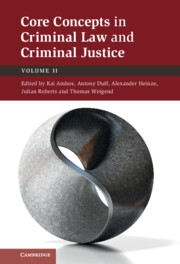Book contents
- Core Concepts in Criminal Law and Criminal Justice
- Core Concepts in Criminal Law and Criminal Justice
- Copyright page
- Contents
- About the Authors
- Abbreviations
- 1 Introduction to Volume II
- Part I Criminal Law
- 2 Structures within Criminal Legal Reasoning
- 3 Causation and Responsibility for Outcomes
- 4 Imputation of Responsibility and Intoxicated Offending
- 5 Crimes of Endangerment
- Part II Criminal Procedure
- Part III Criminal Justice
- Index
- References
4 - Imputation of Responsibility and Intoxicated Offending
from Part I - Criminal Law
Published online by Cambridge University Press: 24 February 2022
- Core Concepts in Criminal Law and Criminal Justice
- Core Concepts in Criminal Law and Criminal Justice
- Copyright page
- Contents
- About the Authors
- Abbreviations
- 1 Introduction to Volume II
- Part I Criminal Law
- 2 Structures within Criminal Legal Reasoning
- 3 Causation and Responsibility for Outcomes
- 4 Imputation of Responsibility and Intoxicated Offending
- 5 Crimes of Endangerment
- Part II Criminal Procedure
- Part III Criminal Justice
- Index
- References
Summary
Perhaps more than any other area of criminal law, the imputation of responsibility for intoxicated offending has been subject to and evolved with changes in social and cultural attitudes, advances in medicine and psychology, and shifts in the principles and aims of punishment. The result has been a technically complex and often contradictory set of prescriptions that specify what counts as intoxication, when an intoxicated person may be held criminally responsible for an alleged offence (and on what basis), and how to measure the degree and extent of their responsibility. This chapter analyses the law of intoxicated offending as a site for exploring the boundaries of, and exceptions to, principles comprising the ‘General Part’ in both common law (with a focus on the United States and England and Wales) and civil law (with a focus on Germany and Switzerland) systems.
- Type
- Chapter
- Information
- Core Concepts in Criminal Law and Criminal Justice , pp. 95 - 131Publisher: Cambridge University PressPrint publication year: 2022



